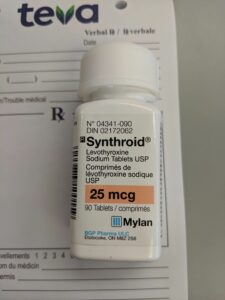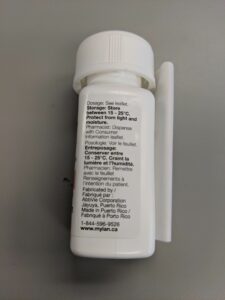CEO of PharmacyChecker On People’s Pharmacy Radio Talking Safety and Savings on Narrow Therapeutic Index Drugs

Joe and Terry Graedon have been helping Americans make better health decisions for the last 40 years, including through their syndicated radio show on National Public Radio called The People’s Pharmacy. As you can imagine, their listeners are interested in prescription drug safety and savings. Our CEO was on their show this past Saturday and I’d like to tell you about it, especially if you want to learn how to save money on brand name drugs.
The CEO of PharmacyChecker.com, Tod Cooperman, MD, is also the founder and president of ConsumerLab.com, the leading evaluator of health and wellness products. ConsuemrLab.com has worked with The People’s Pharmacy in the past to test prescription medications. While I believe that generics sold in the U.S. are usually of the highest quality, equal to or better than generics in most other countries, ConsumerLab.com’s findings show that some generic medications in the U.S. are not always equal to the brand. Due to his expertise is drug quality and his knowledge about drug prices, The People’s Pharmacy brought Dr. Cooperman on to their show last week to talk about Narrow Therapeutic Index (NTI) drugs. Listen to the show! (See minutes 6:50-18:00).
For NTI medications, it’s even more important that the active pharmaceutical ingredient is present in the exact amount required. When NTI medications have too much of the active pharmaceutical ingredient, it can be toxic; but those that have too little may not be adequately efficacious. Most NTI drugs are available in generic form, which usually means they are low cost, even without insurance, and usually lower-priced than in Canada and other countries, too! The opposite holds true for brands.
Some providers are deciding that it’s important for their patients stick with the brand for NTI drugs for the reasons stated above. But the prices here are often too high. In the radio show, Dr. Cooperman recommends looking internationally for those who can’t afford the brand locally. Americans can often find discounts averaging 80% internationally on Brand name NTI drugs. Last summer, when we read The Graedon’s Guide to Saving Money on Medicines, we noticed the list of NTI drugs and wanted to compare drug prices domestically and internationally. Our research from Fall 2016 is below.
Narrow Therapeutic Index (NTI) Drugs: Brand Name Price Comparison (U.S., Canada, International*)
| Per Pill Cost[i] | Potential Savings | ||||||
| Medication Name: Brand (Generic) | Strength | U.S[ii] | Canada[iii] | NZ/UK[iv] | Canada | Other Int’l | Overall |
| Tegretol (Carbamazepine) | 200mg | $2.87 | $0.77 | $0.57 | 73% | 80% | 80% |
| Cleocin HCl (Clindamycin) [v] | 300mg caps | $24.00 | $3.38 | NA | 86% | NA | 86% |
| Catapres (Clonidine HCl) | 0.1mg | $3.34 | $0.45 | NA | 86% | NA | 86% |
| Sandimmune (Cyclosporine) | 100mg /mL 50mL | $664.84 | $327.98 | NA | 51% | NA | 51% |
| Lanoxin (Digoxin)[vi] | 0.125mg | $12.54 | $0.75 | NA | 94% | NA | 94% |
| Depakote (Divalproex)[vii] | 250mg | $5.73 | $0.90 | NA | 84% | NA | 84% |
| Zarontin (Ethosuximide) | 250mg | $4.51 | $0.66 | NA | 85% | NA | 85% |
| Synthroid (Levothyroxine) | 100 mcg (0.1mg) | $1.87 | $0.35 | $0.63 | 81% | 66% | 81% |
| Dilantin (Phenytoin) | 100mg | $1.45 | $0.33 | $0.48 | 77% | 67% | 77% |
| Depakene (Valproic acid) | 250mg | $5.76 | $0.93 | NA | 84% | NA | 84% |
| Coumadin (Warfarin) | 5mg | $3.69 | $0.60 | NA | 84% | NA | 84% |
| Average Savings | 81% | ||||||
[i] Based on three month supply of medication.
[ii] Walgreens, NYC, December 2016
[iii] Prices of international online pharmacies verified by PharmacyChecker.com.
[iv] Prices of international online pharmacies verified by PharmacyChecker.com.
[v] Marketed as Dalacin C in Canad
[vi] Marketed as Toloxin in Canada
[vii] Marketed as Epival in Canada
Tagged with: generic drugs, Narrow Therapeutic Index, The People's Pharmacy, Tod Cooperman





